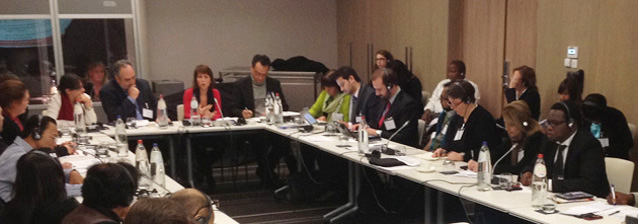Brussels, 11 December 2013.
On 5 and 6 December 2013, the European Union held the 15th EU-NGO forum on Human Rights in Brussels. The event addressed the overarching theme of “accountability” regarding two interrelated topics: 1) the fight against impunity; and 2) accountability for economic, social, and cultural rights (ESCR) violations.
Protection International (PI) is proud to have supported the EU in organizing the roundtable on “National Public Policies and Mechanisms for the Protection of Human Rights Defenders (HRDs): Lessons Learned from Latin America“. The session paid particular attention to HRDs threatened with physical violence and state public policy responses to both counter and prevent such threats. Furthermore, the session analysed current challenges linked to protecting HRDs promoting and defending ESCR in remote areas.
Chaired by Protection International’s President of the Board, Enrique Eguren, the roundtable included speakers from Brazil, Colombia, and Mexico, representatives from the UN Office of the High Commissioner for Human Rights, the Inter-American Commission for Human Rights, the Office of the Commissioner for Human Rights of the Council of Europe and the European Union, as well as over 15 HRDs from Africa, Asia, Europe and Latin America. Participants shared experiences, challenges, and lessons learned in the adoption, implementation, and monitoring of such public policy initiatives in their home countries.
From the participant’s interventions, two issues became clear: legal frameworks (i.e. laws, decrees, or regulations) adopted to guarantee the protection of HRDs have been established under the pressure of, and in cooperation with, national and international human rights organizations. Secondly, the protection of defenders should not be limited to the adoption of physical security measures but should also include preventive action against aggression, judicial investigations to curb the impunity of perpetrators, and the development of measures tailored to the needs of specific groups of HRDs, such as women and community-based defenders.
Moreover, the roundtable promoted discussion on the potential role that the EU and its Member States can play in supporting civil society organizations (CSOs) and states in third countries in their quest to improve the protection of HRDs, including those defending ESCR.
The following actions should be considered to promote this agenda going forward:
1) The EU Guidelines on Human Rights Defenders could become an effective policy tool in the hands of EU Missions to help protect defenders based in remote areas who promote and defend ESCR.
2) The EU should include the assessment of national public policies for the holistic protection of HRDs in its human rights dialogues with third countries, where these policies already exist. Moreover, the EU should encourage their adoption in those countries where such national mechanisms are lacking.
3) EU political and financial instruments should be made available to support CSOs advocating for the adoption of public policies to protect those who promote and defend human rights.


